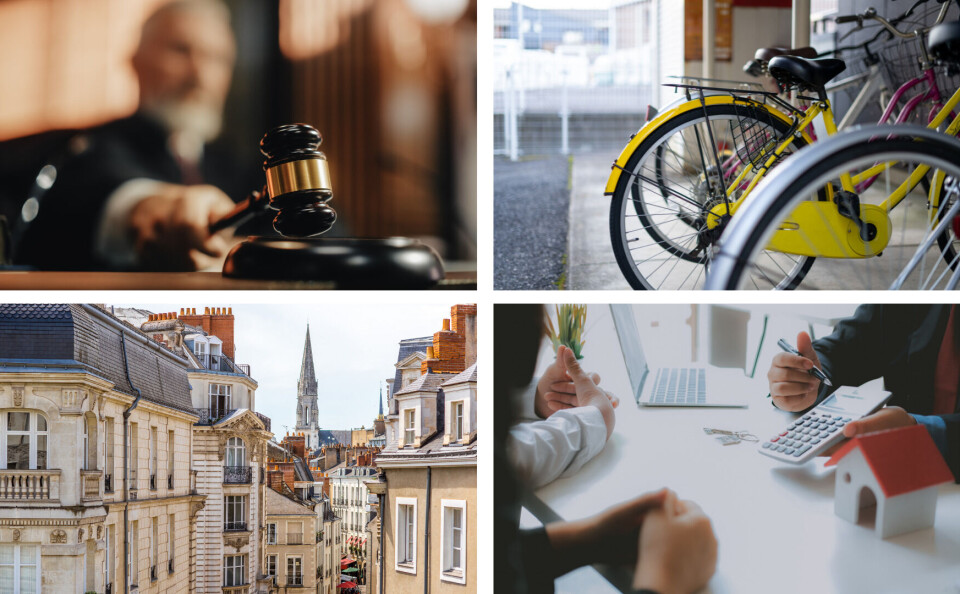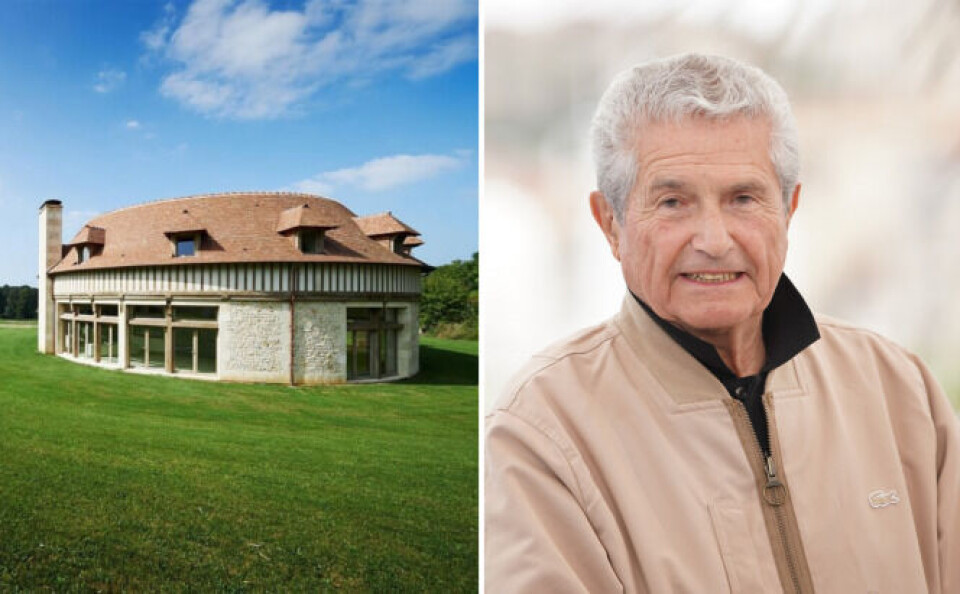-
I had no debits taken for French residential tax - what should I do?
Amounts taken depend on how much, and when, you are scheduled to pay
-
What are the rules for changing your front door in France?
We review the rules, from planning permission to paint colours
-
Thousands of property owners in France sent ‘empty home tax’ bills in error
The bills, payable this December, can run to thousands of euros
Neighbour disputes, second home tax, mortgages: French property update
We also look at bicycle parking in shared apartment blocks and the manor house for sale with an intriguing silver screen pedigree

Encroaching on a neighbour’s property is (mostly) a black and white issue
France’s highest court has made it clear that encroaching on a neighbour’s land is unlawful, even if the work has minimal impact on them and demolishing it will be costly.
The Cour de cassation ruling concerned the building of a villa supported by underground tie rods to ensure the stability of the walls, which protruded under the neighbouring plot.
The owner of this plot demanded their removal, but the couple who were carrying out the work objected that it would cost too much, and that in any case their neighbour was not impacted by the rods.
By making such a demand, they continued, he was abusing his right to defend his property.
Read more: What is law in France on neighbour's trees growing into my property?
The court disagreed, ruling in November, that a homeowner can demand the removal of anything that encroaches on his land, regardless of the cost to his neighbour and without further need to investigate.
It added that the request did not constitute an abuse of the right to defend one's property, citing the "absolute and perpetual nature of the right of ownership", reports Le Figaro.
Read more: French gutter rules stop rainwater soaking the neighbours
However, another property encroachment case, judged on the same day, proves that there can sometimes be legal leeway.
In that instance an encroachment of 8cm on a neighbour’s plot was deemed admissible by the Cour de cassation because it fell within the surveyor’s margin of technical error when they gave their initial building measurements.
Nantes raises taxe d’habitation second home surcharge to 60%
Second-home owners in Nantes could see a significant increase in the taxe d’habitation (residence tax) they pay in 2023, when a surcharge of 60% starts being applied on properties that are uninhabited for more than six months a year.
The measure was voted through in the Nantes Métropole budget at the beginning of 2022 but only comes into force on January 1.
Taxe d’habitation is in the process of being phased out for main homes: only 20% paid it this year and it will be gone completely for principal residences by 2023.
Read more: Taxe d’habitation deadline approaches in France: Who still pays this?
However, the tax is being maintained for second homes, and urban areas which are classed as zones tendues (subject to housing shortages) can choose to increase the basic rate by up to 60%.
A new list of zones tendues is expected to be outlined soon in a government decree. It is likely to include 5,000 communes, as opposed to the current 1,149.
Read more: Second home tax increase: Where in France may be affected by new law?
Previously, the taxe d’habitation surcharge was set at 20% in the Nantes area, reports FranceInfo, and represented a contribution of around €700,000 for local authorities.
With the reform, this revenue will increase threefold.
Other cities that have decided to apply the maximum 60% surtaxe include Bordeaux, Lyon, Biarritz, Nice, Marseille and Paris.
Local authorities in Nantes hope the measure will help regulate the number of unoccupied homes in the area, estimated to number 4,800, by encouraging second-home owners to sell up or rent out as a main home to a tenant/s.
The extra revenue the surtaxe generates can also be used to improve permanent housing stock by buying land or building social housing.
Shared apartment blocks must provide secure bicycle parking
Bicycles stashed in the corridors, halls and balconies of shared apartment blocks (copropriétés) could soon be a thing of the past as a new provision for their secure parking comes into force.
From the end of the year, copropriétés with car parking will also have to provide an area big enough to accommodate one bicycle per apartment.
For new buildings, however, two spaces must be provided if apartments comprise three or more main rooms.
Crucially, the space has to be completely secure, allowing bikes to be attached to a fixed device via their frame or at least one wheel, and remain stable.
The bicycle garage must be located in the same place for all residents, the new legislation continues, preferably on the ground floor or first basement of the copropriété’s car park, and each bay should measure at least 1.5m²
Access must be provided by a door with a secure locking system.
"And, when they are located outside a building, these infrastructures must be covered, lit and enclosed," Eric Audineau, a property lawyer, told Le Monde.
Read more: Would our French house insurance cover our new electric bikes?
Only when there is no available parking space accessible from communal areas, and/or access cannot be adapted, will buildings be exempt from the new rules.
This may be the case for underground car parks with ramps, for example, that can only be used by cars and might be dangerous for cyclists to share.
Similarly, buildings without any car parking at all can avoid installing bicycle garages, even if they have sufficient space in inner courtyards or other common areas.
"Secure bicycle parking is still a daily struggle, especially in copropriétés, and it is a pity that many buildings are able to avoid considering the issue," the Fédération française des usagers de la bicyclette (FUB) told Le Figaro.
In this case it is up to co-owners themselves to raise the issue in residents’ meetings.
Read more: France looks to make eco-renovations easier for flat owners
An earlier 2019 law provides that one or more co-owners may be authorised to carry out the work at their own expense if others refuse. Should that happen, the spaces would be reserved for those who paid for the work.
Rise in usury rates could spell good news for mortgages
Tightened lending conditions and the traditional year-end market slowdown as banks hit their commercial targets are making it increasingly tough to take out mortgages.
Read more: Time to sell not buy property in France advise majority of notaires
But there could be light at the end of the tunnel, with usury rates set to rise on January 1.
"The most cautious predict a rise in thresholds to 3.5% or 3.6% for loans of 20 years or more, while a more optimistic forecast is 3.7%,” Cécile Roquelaure, director of research at the Empruntis brokerage network, told Merci pour l'info.
The usury rate is intended to protect borrowers from getting into debt at a prohibitive cost – it essentially caps all the costs of a home loan including the interest, arrangement fees, any brokers' commission and borrower insurance, known collectively as the APR.
If the APR is higher than the usury rate, the loan is considered illegal.
Read more: Can I get a mortgage to fund renovation works in my French house?
The usury rate is calculated each quarter by the Banque de France, which takes into account the average rates charged by banks over the last three months.
With lending rates rising sharply since the beginning of the year, however, the three month delay in reviewing usury rates has frustrated mortgage providers, who say they no longer reflect the reality of the market and limit the volume of loans they can grant.
Banque de France already raised the usury rate on October 1, pushing it from 2.57% to 3.05% for loans of 20 years or more.
But Ms Roquelaure says this only temporarily improved the situation "for two or three weeks” and did not leave much leeway for banks to increase their lending rates.
She said a further rise in January should have a positive impact lasting a maximum of one month.
However, she anticipates the mortgage market will recover more strongly in the second quarter of 2023.
From April 1, usury thresholds will change again and, as happens in the first half of every year, banks will be "looking for new customers".
Director’s round house offers chance to buy slice of film history

Claude Lelouch’s property is for sale for €7.5million. Credits: SAFTI / Denis Makarenko / Shutterstock
Real estate and the rarefied world of French cinema seldom get mentioned in the same breath, but the sale of a Normandy manor owned by the celebrated director Claude Lelouch provides a notable exception.
The property was built in 2010 and has been a backdrop for several of the movie-maker’s films, including 2019’s Les Plus belles années d'une vie (The Best Years of a Life), for which it was originally designed.
Read more: Downton Abbey’s new film puts French locations in the spotlight
Just as intriguing as its set history, however, is the property’s shape – it is completely round, with a swimming pool in the centre.
"It is round so that the sun can always enter the house,” the director explained to La Maison France 5 in the past.
“It's like a loft, but the problem with a loft is that you can’t escape seeing people.
“Here though, because of the structure in the middle, if I'm on the other side I can't be seen.
“We are isolated from each other, while still being in an open space.”
The spacious manor comprises five bedrooms, with a luminous reception area of around 200m² alone.
It is set in four hectares of land, part of which has been laid out as a golf course, on the outskirts of Deauville.
Those interested will need deep pockets – the house is on the market for €7.5million.
The proceeds of the sale will reportedly be used by Mr Lelouch, now 85, to finance other film projects.
He is best known for his 1966 romantic melodrama Un homme et une femme (A Man and A Woman), which won Oscars for Best Original Screenplay and Best Foreign Language Film.
Read more: Filming for Woody Allen’s first-ever all-French film begins in Paris
In the past, the director has often preferred to build real sets rather than shoot in places that have to be dismantled once filming is finished, even if it means selling the properties afterwards.
Related articles
Best value heating options, renovation issues: French property updates
Renovation loans, evictions, house swaps: Five French property updates
Taxe foncière, taxe d’habitation: how are these worked out in France?























